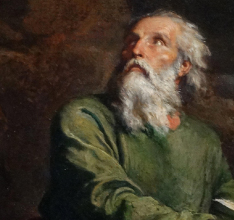There were more Christian martyrs in the twentieth century than in all of the previous nineteen centuries combined. Hitler, Stalin, Mao, Pol Pot, and many of their lesser-known totalitarian colleagues put millions of Christians to death for their faith in that terrible hundred- year period.

One of the saddest features of the still-young twenty-first century is that this awful trend is undoubtedly continuing. By far the most persecuted religious group in the world today are Christians, and they are dying by the thousands especially in the Middle East and in Africa. Though Hindus and Buddhists have indeed been targeting Christians, their most egregious aggressors, by leaps and bounds, have been radicalized Muslims, the recent mass-killings in Sri Lanka being but the most recent example of this kind of violence. I have stated this fact simply and bluntly, because I am convinced that no solution can be found unless and until, at the very least, we speak truthfully.
As many commentators have pointed out, the cultural and media elites in the West have been comically dissembling and obfuscating in this regard. The statements of former President Barack Obama and former Secretary of State Hillary Clinton regarding the Sri Lanka bombings, which referred to the victims not as Christians or Catholics but as “Easter worshippers,” are a particularly pathetic case in point. But little better are the hundreds of editorials, opinion pieces, articles, and books that characterize these attacks as, primarily, economically and politically motivated, or the fruit of cultural resentment. I have no doubt whatsoever that all of these factors have played a role, but we are blind not to see that the chief driver of this violence has been, first and foremost, religion. Now I certainly understand it is to no one’s advantage to stir up religious tensions, especially in pluralist societies, but the denial of religion as the chief cause of these outrages is disingenuous at best, dangerously stupid at worst.
A good deal of this is due to a theory, still stubbornly persistent among the elite commentariat in the West, that religion is (or at least ought to be) fading away. The “secularization hypothesis,” proposed from the time of Comte, Nietzsche, and Marx, is, despite significant evidence to the contrary, widely subscribed to among Western opinion-makers. On this reading, the religious is never what is “really” going on; rather, it is a super-structural cover for economics or politics or race relations or the struggle for cultural hegemony. But until we see religious disagreement as indeed what is really going on in the present violence, we aren’t going to solve the problem. Hans Kung is a theologian I rarely agree with, but he was dead right when he commented that there will be no peace among the nations until there is peace among the religions. And there will be no such peace until the religions find some common ground on which to stand, some context in which a real dialogue and conversation can take place.
But what could possibly constitute such ground? Aren’t Christianity and Islam—to stay with the two faiths that are clashing most dramatically today—simply incommensurable and mutually exclusive systems of belief? Aren’t they based on revelations repugnant to one another? Might I suggest an answer to these questions by hearkening back to an earlier time? In the thirteenth century, Thomas Aquinas constructed an intellectual system, cathedral like in its beauty and complexity, on the basis of both faith and reason. As he articulated the meaning of Christian revelation, he used the tools provided by the science and philosophy that were available to him. In constructing this rational edifice, he relied on pagan, Jewish, and Christian philosophers, but among the most important of his influences were philosophers and theologians of the Islamic tradition. Aquinas’ metaphysics is, quite simply, unthinkable apart from the work of Averroes, Avicenna, and Avicebron, Muslim theorists all. During the high Middle Ages, Christians and Muslims did indeed dialogue on the basis of a shared intellectual heritage, but it is precisely the waning of the influence of these great philosophic masters within Islam and the rise of a will-based, positivistic approach that has contributed mightily to the conflicts we witness today. And if we might set aside the passions roused by his admittedly awkward use of an example of a dysfunctional Christian/Muslim conversation, it would be helpful to return to the famous Regensburg Address of Pope Benedict XVI. What the Pope was calling for in that speech was an enthusiastic retrieval of a tradition embedded deep within Christianity—namely, the use of reason, grounded in the conviction that Jesus is the incarnation, precisely of the Logos (reason) of God. As long as religion is marked primarily by will (and he was indeed critiquing contemporary radical Islam on this score), it will tend to resort to violence. And in bringing forward the Logos tradition, he was summoning Islam to return to a perhaps forgotten or underutilized dimension of its own heritage.
Are certain Muslims attacking Christians today on religious grounds and for religious reasons? Yes. Is at least a significant part of the problem a strain of voluntarism and irrationality within Islam? Yes. What’s the way forward? If I might cite a prophet sacred to both Christianity and Islam: “Come, let us reason together.”




